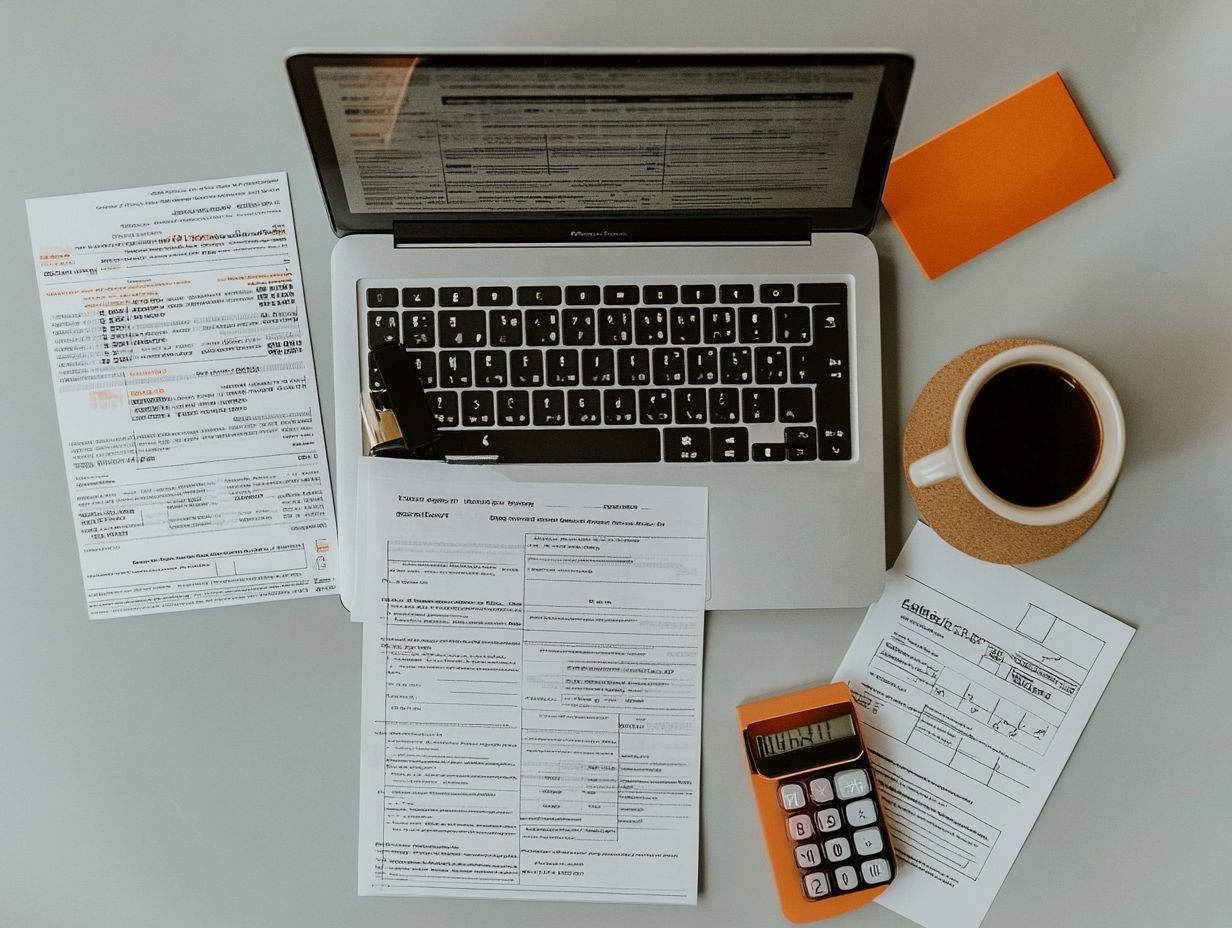5 Ways Freelancers Can Prepare for Tax Season
Don t let tax season stress you out. Tax season can feel overwhelming for freelancers, often shrouded in confusion and uncertainty. With incomes that fluctuate and expenses that vary, navigating the complexities of the tax landscape demands meticulous planning.
This article outlines five essential strategies to help you stay organized, maximize deductions, and ensure timely filings, which are crucial for freelancers.
From diligently tracking your income and expenses to understanding the advantages of hiring a tax advisor, these insights will empower you to approach tax season with confidence and clarity.
Dive in to streamline your tax preparation process!
Contents
- Key Takeaways:
- 1. Keep Track of All Income and Expenses
- 2. Understand Tax Deductions and Credits for Freelancers
- 3. Set Aside Money for Taxes Throughout the Year
- 4. Consider Hiring a Tax Professional
- 5. Stay Organized and File Taxes on Time
- What Are the Tax Obligations for Freelancers?
- Frequently Asked Questions
- What does it mean to prepare for tax season as a freelancer?
- Why is it important for freelancers to prepare for tax season?
- What are some key documents that freelancers should have ready for tax season?
- Are there any deductions or credits freelancers should know about during tax season?
- How can freelancers stay organized during the year?
- What are common mistakes freelancers make during tax season?
Key Takeaways:

- Keep track of all your income and expenses to accurately report your earnings and deductions.
- Understand the tax deductions and credits available to freelancers to maximize savings.
- Set aside money for taxes throughout the year to avoid a financial burden come tax season.
1. Keep Track of All Income and Expenses
For freelancers like you, keeping meticulous track of all income and expenses is not merely a good practice; it s an essential strategy for effective tax planning. This diligence ensures compliance with IRS regulations rules set by the Internal Revenue Service, the U.S. tax authority while minimizing your tax liability.
By maintaining accurate financial records, you gain clarity on your income projections and can prepare for those quarterly tax payments, making tax season a breeze.
Tools like QuickBooks can simplify this record-keeping process, allowing you to manage your business-related expenses with ease. Understanding how each expense impacts your freelance income enables you to strategically deduct business expenses and optimize your tax situation.
If you prefer a more hands-on approach, employing spreadsheets can be a straightforward alternative. By creating categories for expenses like travel, supplies, and marketing you can analyze your spending patterns, which is crucial for budgeting and future planning.
Maintain both digital and physical copies of receipts, including those related to the home office tax deduction. This provides tangible proof of transactions and helps resolve any potential discrepancies with the IRS. This simple method makes tax time easier and gives you peace of mind.
By integrating these practices into your routine, you can significantly enhance your financial literacy and preparedness for tax obligations.
2. Understand Tax Deductions and Credits for Freelancers
Freelancers need to grasp the various tax deductions and credits available to effectively reduce their overall tax liability. This means recognizing eligible expenses related to working for yourself, such as the home office tax deduction, which can significantly lower your taxable income and contribute to a favorable tax situation.
It’s also essential to understand how different business structures can influence the deductions available to you, especially since freelancers typically receive 1099 forms like 1099-MISC or 1099-NEC instead of W-2 forms. Experts such as Jackie Lam and Kiplinger stress the importance of familiarizing yourself with the full spectrum of deductions to maximize your tax benefits.
For example, you can deduct business-related costs, including supplies, software subscriptions, and advertising expenses those can really pile up, especially as you manage your freelance income. Don t overlook how health insurance and retirement contributions can open the door to potential tax credits, easing your financial burden even further.
The decision to operate as a sole proprietor or form an LLC can also impact your tax obligations, including self-employment taxes, which include Social Security and Medicare tax, shaping your long-term personal finance strategies. As filing deadlines loom, it s crucial to maintain meticulous records of your expenses and consult tax professionals to ensure compliance and optimize your returns.
3. Set Aside Money for Taxes Throughout the Year
Setting aside money for taxes throughout the year is crucial for freelancers. It helps manage the money you think you’ll owe in taxes and avoids unwelcome surprises during tax season.
By proactively calculating your expected tax liability based on income projections, you can determine the right amount to set aside for quarterly payments to the IRS. This practice also sharpens your financial literacy and keeps you in compliance with IRS requirements, helping you steer clear of penalties for underpayment or late payments.
Employing a systematic approach to estimate your income can significantly enhance this process. By using past earnings to project future income and applying current tax rates, you can achieve much more accurate calculations for your estimated tax payments.
Establishing a separate savings fund specifically for tax payments is essential. Treat those contributions as a non-negotiable expense in your budget.
By regularly adding to this dedicated account, you can build a cushion that alleviates financial stress and makes managing your tax obligations much easier as they come due.
4. Consider Hiring a Tax Professional

Hiring a tax professional or advisor can be a game-changer for freelancers, especially when navigating the intricate maze of tax filing and IRS regulations. With their expertise, you can ensure your financial records are accurate and optimize your tax situation by uncovering potential deductions and credits that might otherwise slip through the cracks.
This professional guidance saves you time and significantly reduces stress. It can lead to better financial outcomes by minimizing tax liabilities and ensuring your filings are completed accurately and on time.
Beyond these core advantages, working with a qualified tax professional means you ll receive personalized tax strategies tailored to your unique circumstances. Imagine the peace of mind that comes from knowing an expert is handling the nitty-gritty details it’s a fantastic way to ease the anxiety often associated with tax season.
They stay well-informed about the latest tax laws and changes, arming you with insights that can inform your strategic planning. As you consider your options, think about engaging professionals such as:
- Certified Public Accountants (CPAs)
- Enrolled agents
Each of these experts brings distinct strengths to the table. It is wise to seek their services when starting a new business venture, facing significant tax changes, or when audits are on the horizon.
Experts like Kiana Curtis or those found through resources like the VITA program can provide invaluable support in your financial journey.
5. Stay Organized and File Taxes on Time
Staying organized and filing your taxes on time is crucial for freelancers. It helps avoid penalties and ensures compliance with IRS regulations.
This means keeping detailed financial records that simplify the filing process, such as tracking your income, expenses, and potential tax deductions throughout the year. It’s essential to be aware of filing deadlines for your Schedule C, which is the form used by freelancers to report income or loss from their business.
Prepare your documents in advance to sidestep last-minute stress. Being prepared lets you seize every deduction available to you!
Consider leveraging financial management software to automate your expense tracking and provide insights into income trends. This makes it easier for you to generate accurate reports.
Setting reminders for important tax-related deadlines is another effective strategy that keeps those essential dates front and center. It significantly reduces the likelihood of oversight.
Creating comprehensive checklists for required documentation streamlines your preparation. It ensures nothing slips through the cracks come tax season.
By adopting these proactive tools and practices, including utilizing platforms like QuickBooks or Bonsai, you can transform what often feels like an overwhelming chore into a manageable and efficient process. This leads to a more relaxed filing experience.
What Are the Tax Obligations for Freelancers?
Freelancers face unique tax obligations that set them apart from traditional employees, primarily due to their self-employment status. You are responsible for paying Social Security and Medicare taxes, which employers typically handle for those on W-2 forms.
Understanding your tax obligations is crucial for your success! You must grasp the importance of estimated quarterly tax payments to the IRS.
Accurately reporting your freelance income and following the tax rules for self-employment is vital. By fully understanding these responsibilities, you can prepare to meet your obligations and avoid potential penalties.
Navigating the complexities of self-employment can feel overwhelming, especially regarding taxes. Familiarizing yourself with receiving 1099 forms from clients is important, as these documents are essential for tracking your income.
Maintaining meticulous records of all business-related expenses can significantly reduce your taxable income, so don t overlook this aspect. Utilizing accounting software or consulting a tax professional can greatly enhance your ability to meet financial obligations.
Ultimately, ensuring compliance with these requirements is essential not just for your legal peace of mind, but also for securing long-term financial stability, especially when navigating the complexities of self-employment taxes.
How Can Freelancers Keep Track of Income and Expenses?
Freelancers like you can effectively manage income and expenses by utilizing a range of tools and strategies designed to simplify your financial record-keeping. For example, software such as QuickBooks can automate income tracking and categorize expenses easily, making the entire process much simpler.
Using tools like the self-employed tax center can also help simplify your tax obligations. By consistently organizing your financial records and regularly updating your accounting information, you maintain a clear picture of your business’s financial health.
This clarity enables you to make informed decisions about tax planning and budgeting. Besides specialized accounting software, using simple spreadsheets offers a customizable way to track your finances.
Mobile applications like Mint or Expensify provide convenient, on-the-go capabilities, allowing you to record expenses immediately and ensuring nothing slips through the cracks. This is particularly useful for tracking freelance income.
Regularly updating these records is crucial. Not only does it help you identify trends in your spending and earning patterns, but it also prepares you for tax season.
By staying organized and proactive, you can avoid last-minute scrambles and maximize your deductions, ultimately paving the way for greater financial stability. This diligence is particularly important for managing your tax liability.
Start tracking your income today to avoid tax season stress!
What Are the Most Common Tax Deductions and Credits for Freelancers?

Freelancers like you can reap substantial rewards from a variety of tax deductions and credits specifically designed for your unique work environment and business expenses. Among the most notable deductions is the home office tax deduction, which allows you to deduct a portion of your living space if it s used exclusively for business.
Remember to keep your 1099 forms handy for reporting freelance income. You can also deduct other business-related expenses ranging from equipment and software to travel costs. Experts such as Jackie Lam and Kiana Curtis emphasize the importance of grasping these deductions, including the essential tax documents every freelancer should keep, to maximize your potential tax savings while ensuring compliance with IRS regulations.
Unlock big savings by leveraging these tax benefits to lower your taxable income! For example, costs associated with freelance services like marketing expenses (such as costs for ads or promotional materials) or professional development courses are eligible for deduction, including those outlined in the self-employed tax center.
You can also deduct vehicle expenses incurred while meeting clients or running business-related errands, utilizing either actual costs or the standard mileage rate. These deductions are crucial for freelancers managing fluctuating income levels.
Mastering the art of listing your expenses is essential for freelancers like you who wish to retain more of your hard-earned income. This includes understanding how to deduct business expenses effectively while deftly navigating the complexities of the tax code.
How Much Money Should Freelancers Set Aside for Taxes?
Determining how much money to set aside for taxes is essential for you as a freelancer to effectively manage your estimated tax payments and sidestep any unexpected financial burdens. A good rule of thumb is to reserve about 25-30% of your income for federal taxes, which covers both your income tax liability and self-employment taxes. This is particularly important when planning your quarterly tax payments.
By calculating your expected tax liability based on income projections, you can make informed decisions about your savings strategy throughout the year. This includes estimating quarterly taxes to avoid underpayment penalties.
It’s wise to consider potential deductions, such as business-related expenses, which can significantly reduce your taxable income. Additionally, freelancers should be aware of tax credits they shouldn’t miss. Keeping meticulous records of all your expenses, including W-2 forms and 1099-MISC, and regularly reviewing your income will help you promptly address any fluctuations.
Regularly adjusting your savings contributions based on income levels not only aids in meeting your tax obligations but also nurtures a sense of financial security. Plan now to avoid unwelcome surprises later on tax day! This strategic planning allows you to concentrate more on your projects and less on financial stress, ultimately enhancing your personal finance management.
What Are the Benefits of Hiring a Tax Professional?
Hiring a tax professional or advisor can be a game-changer for freelancers like you. They offer a wealth of benefits, including expert guidance on tax planning and finding ways to reduce the amount of taxes you owe. This can help you minimize your tax liability and keep more of your hard-earned money. Understanding the complexities of your business structure is particularly valuable.
A professional ensures your financial records are accurate and up-to-date. This is crucial for complying with IRS regulations and can lead to significant cost savings. By having a tax advisor in your corner, you can ease some of the burdens that come with tax season, allowing you to focus on your work while feeling confident that your tax obligations are being expertly managed, including your Medicare and Social Security contributions.
Their expertise enables the development of personalized strategies tailored to your unique financial situation. This significantly enhances your overall tax efficiency. If you’re navigating the complexities of self-employment and fluctuating income levels including understanding the implications of Schedule C (a form used by sole proprietors to report income or loss) enlisting professional help becomes increasingly wise, especially as your income grows or your tax situation becomes more intricate.
If you find yourself feeling overwhelmed by tax laws or uncertain about potential deductions, it s a clear sign that it s time to consult a qualified tax expert. This partnership not only brings peace of mind but also opens the door to opportunities for maximizing financial benefits that you might have overlooked otherwise, such as utilizing the VITA program for assistance.
What Are the Consequences of Not Filing Taxes on Time?
Freelancers who neglect to file their taxes on time can encounter significant repercussions. This includes hefty penalties from the IRS that can seriously impact financial stability. These penalties may consist of late filing fees, interest on unpaid taxes, and the looming threat of audits if any discrepancies pop up in your financial records. Recognizing the implications of missing tax deadlines highlights the critical need for timely and accurate tax filing especially concerning your estimated quarterly taxes. Don t wait until it s too late!
The emotional burden of unexpected financial issues can be overwhelming, affecting both your personal and professional life. By adhering to deadlines, you not only dodge those pesky penalties but also cultivate a sense of responsibility and organization that can enhance your overall business operations. Maintaining clear financial records is key to this process.
To reduce the risk of late filings, consider establishing a dedicated schedule for tax preparation throughout the year. Keep meticulous records of your income and expenses, including your 1099-NEC forms, and set reminders well in advance of deadlines. Taking these steps can lead you to fantastic peace of mind and opens the door to potential tax benefits, including those outlined in Maximizing Deductions: A Freelancer’s Guide, that come with early preparation.
Frequently Asked Questions

What does it mean to prepare for tax season as a freelancer?
Preparing for tax season as a freelancer involves organizing your finances, gathering necessary documents including 1099 forms and W-2 forms, and making necessary payments to ensure your taxes are filed accurately and on time.
Why is it important for freelancers to prepare for tax season?
Preparing for tax season allows freelancers to avoid last-minute stress and potential penalties for late or incorrect tax filing. It also helps to ensure that all deductions and credits are claimed, including the home office tax deduction, maximizing tax savings.
What are some key documents that freelancers should have ready for tax season?
Freelancers should have all income statements, such as 1099 forms and W-2 forms, as well as expense receipts, records of estimated tax payments, and any relevant deductions or credits documentation ready for tax season particularly focusing on their business-related expenses.
Are there any deductions or credits freelancers should know about during tax season?
Yes! Freelancers can benefit from deductions like home office expenses and business-related travel.
Keep accurate records and consult a tax professional to get the most savings.
How can freelancers stay organized during the year?
Create a system to track your income and expenses.
Use accounting apps like Bonsai and keep all documents in one place to prepare for tax season without stress.
What are common mistakes freelancers make during tax season?
Freelancers often forget to keep accurate records or miss tax payment deadlines.
Educate yourself on tax laws and stay organized to avoid these pitfalls!






